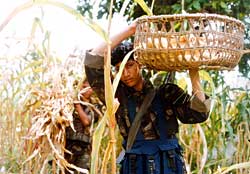 Here on the fertile plains of the Karnali, the maize fields are ripe. The comrades have guns slung over their shoulders as they help villagers pluck the cobs. Most young men and women have fled the villages and there aren't enough people to work the fields.
Here on the fertile plains of the Karnali, the maize fields are ripe. The comrades have guns slung over their shoulders as they help villagers pluck the cobs. Most young men and women have fled the villages and there aren't enough people to work the fields. The Maoists wipe the sweat from their faces and adjust the straps on their captured SLRs and INSAS assault rifles. A young female Maoist carries a 303, and expertly breaks the maize from the stalks.
Resting, the talk turns to the brutal killing of 12 Nepalis in Iraq. It is the party line: "The Nepalis died because the remote control of Nepali politics is in the hands of the imperialist Americans," explains Biswajit, who handles communications for the Maoists in the Banke-Bardiya region.
It is a hot and quiet afternoon. There are only the sounds of handpumps and children playing in the village, some 20km off the main highway. It seems everyone who doesn't support the Maoist movement migrated elsewhere long ago. Everyone who stayed behind is with the rebels, there isn't any other way.
 An army helicopter flies overhead, but the Maoists don't even try to hide. As the sun sets over the jungles to the west, we head back to the village. A yellow light spills out of the shops into the dusty street. The children are playing since it is a holiday tomorrow. The Maoists run the schools, but the government still pays the teachers.
An army helicopter flies overhead, but the Maoists don't even try to hide. As the sun sets over the jungles to the west, we head back to the village. A yellow light spills out of the shops into the dusty street. The children are playing since it is a holiday tomorrow. The Maoists run the schools, but the government still pays the teachers. A few men huddle outside a medicine shops that also sells cigarettes, chewing tobacco, biscuits and instant noodles. The new Maoist monthly Tarai Voice is out and the locals read it avidly. Every now and then, the local commander calls out a name in the crowd, whispers something and sends the person off on a bicycle to carry messages for the planned Banke-Bardia banda.
The Maoists have started their own customs check points along the Indian border and the leaders keep tabs on things by riding around the outback on motorcycles. The last time the security forces came this way was four months ago. They asked questions and never came back. Even if they did, who would they arrest? Almost every young and able-bodied villager remaining here is a militia member.
But some youngsters are confused about what it is they are fighting for. "I have done the WT (whole time) training for the militia, but I don't know which army to join," says a 19-year-old. "I like what the people's army stands for, but if I join the royal army I can earn more money for my family. My family would have to move away if I joined the royal army, though."
The village wakes up at five, there is lots to do on the farms, Every day is a struggle for survival and working in the fields is hard because there are so few people left. Children in tattered clothes, their mothers and elderly farmers give Biswajit a lal salaam as we pass. In many parts of Nepal, the people may support the Maoists out of fear, but here there is no choice. There is no government to support, and even if there was, the people are disillusioned with the way they have been abandoned-a fact that the rebels have been quick to exploit.
Past excesses by the security forces have also pushed the villagers to the Maoist fold. Villages here have been renamed after 'martyrs'. "This is Jivangaun," a young boy told us. He doesn't even know the original name of his village. The security forces used to come through in sweeps and take away anyone they thought was a Maoist sympathiser.
"They used to come at night. Once they took away the husband and wife from one of the houses and shot them in the jungle," one villager told us. A widow and mother of three, says she won't die without avenging her husband's death. "The security forces arrested him and later took him to the Gulariya jail. They had no evidence he was a Maoist but they never told us what they did to him," she said. "Since then the party has given me support and strength."
Villagers now speak about the 'new regime' as if it is a foregone conclusion, and it is clear where they get this line of reasoning from. Asked why the Maoists are destroying government buildings and infrastructure, Biswajit tells us: "We must destroy everything that sustains the old regime and build the new one from the roots up."
The Maoists remain good at turning things their way. Even Biswajit admits it is easy to convince the locals that the government is useless and the security forces are monsters. Their line is: government offices are destroyed because they are corrupt and harass local people, Narayanhiti is using donor funds to quell the people's uprising which is why the NGOs should register and work with the Maoists at the grassroots, the army has tortured people so we must fight them.
At least in these villages of Bardiya, it seems recruitment into the Maoist fold is not a problem.


